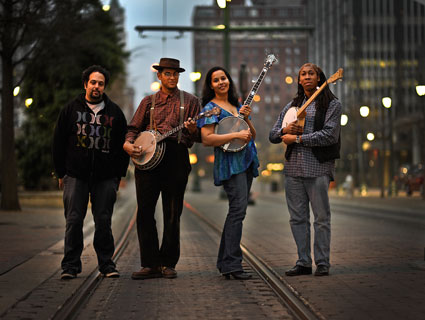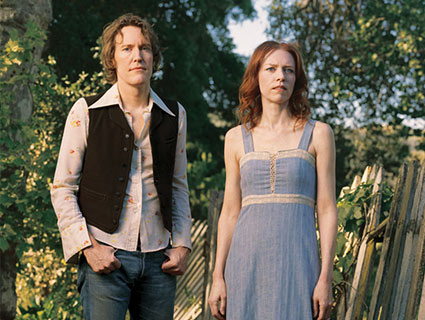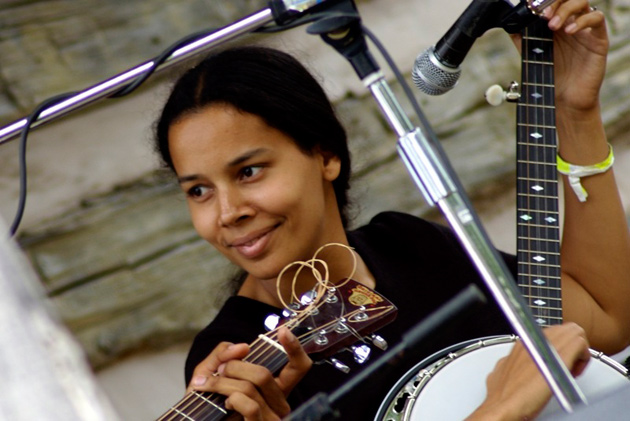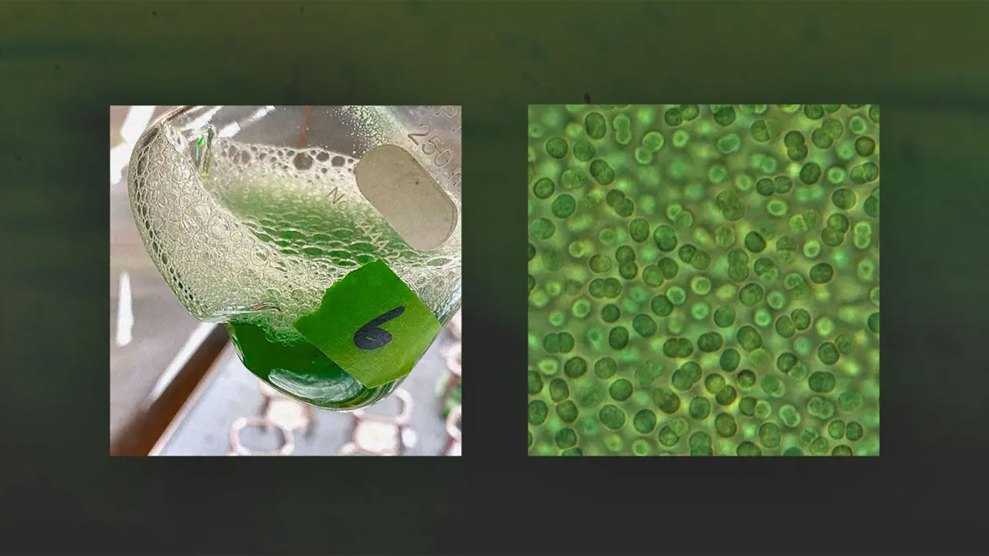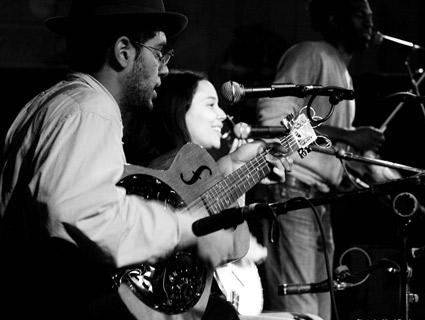
The original lineup, from left: Dom Flemons, Rhiannon Giddens, Justin Robinson.Nigel Bewley
The Carolina Chocolate Drops were on fire in the wake of their 2010 release, Genuine Negro Jig. Deemed that year’s best album by veteran music writer Greil Marcus, it sold briskly, topping the folk and bluegrass music charts. The Chocolate Drops, who found a niche reviving the spirit and music of a nearly forgotten tradition of black American string bands, were critical darlings, praised by the New York Times, performing on NPR’s Fresh Air, and making the rounds on BBC Radio. They would walk away with that year’s Grammy for best folk album.
Passionate and multitalented, the bandmates didn’t exactly come off some back porch in Appalachia. Rhiannon Giddens, a North Carolina native who plays fiddle and banjo, is a classically trained singer who attended conservatory at Oberlin. Guitarist, singer, banjo player, and percussionist Dom Flemons, the showman of the trio, hails from Phoenix, where he immersed himself in old blues and jazz and rock and roll before embracing the folk and old-time scene. The third founding member, North Carolina fiddler and singer Justin Robinson, recruited Giddens to play sessions at the house of the late, legendary black fiddler Joe Thompson. Flemons, who had been collaborating with Giddens since the two met at a 2005 national Black Banjo Gathering, joined the others at Thompson’s house, and eventually the three young’uns broke out on their own.
But this past year was a challenging one for the Chocolate Drops. Robinson quit the band, leaving the others scrambling for a replacement. They soon settled on Hubby Jenkins, a young multi-instrumentalist from New York who shares his bandmates’ ethnomusicological flair. They also enlisted the services of cellist Leyla McCalla and beatboxer Adam Matta for the latest album Leaving Eden (reviewed here), which came out in late February and also hit No. 1 on the bluegrass charts. The band’s latest coup was getting a slot on the T-Bone Burnett-produced soundtrack for The Hunger Games with the song “Daughter’s Lament.” As the band embarked on its current national tour, I spoke with the talented Flemons, 29, about changing things up, growing up black in Arizona, and why he dresses so funny.
Mother Jones: So it was through Rhiannon that you met Joe Thompson, the band’s late mentor?
Dom Flemons: Justin started going down to Joe’s house and Joe needed a banjo player—his style of fiddling works off the banjo. So Rhiannon started joining him. I moved to North Carolina, and by that time they were starting to lock into Joe’s music. So I started playing guitar, jug, snare drum, what have you, on top of what they were doing, backing up Joe. Once we went on our own and started jamming outside of Joe’s house, that was when we really started to develop the sound of the group.
MJ: And it was Thompson, really, who brought this band together?
DF: Oh, absolutely. That’s why there was so much heft in our music right from the get-go; it was from sitting with Joe Thursday nights for like three years, learning tunes and learning how to play really tight. And then when we go on our own, we had all that power and all that tradition.
MJ: What led to the parting of ways with Justin?
DF: Justin is very much a homebody. He loves animals and plant life, and North Carolina is really where his heart’s always been. Being on road was never really ideal for him, and it finally came to a head. We tried our best to adjust around him wanting to be home more, and eventually it was just, “Okay, I can’t do this any more.” You know, it was amicable.
MJ: But it also must have been a huge blow? I mean, you’re this Grammy-winning band with tons of momentum, and then suddenly you’re back to square one.
DF: Absolutely. It left Rhiannon and I in kind of an odd situation, because we had all these gigs set up and it was time to hit the road again, and we needed to get back in it.
MJ: How’d you find Hubby?
DF: I’ve known Hubby for several years, since he was about 18. He was part of this collective in Brooklyn called Roots and Ruckus. Their main venue is a place called the Jalopy Theater. When I first met them it was very similar to what you saw in the early ’60s with a lot of the folk singers and neoethnics—they call them “city billies” too—people in the city that were interested in traditional music and were adapting that to their own performance style. I started to produce a solo record for Hubby for Music Maker. Maybe a couple months after we started to work on that, Justin quit. Hubby had just started to play mandolin and was spending a lot of time with Peter Stampfel, one of the founding members of the Holy Modal Rounders. He was getting a lot into old-time music, and so I asked him to join us.
MJ: You also picked up the Adam Matta. I remember seeing Doug E. Fresh, the human beatbox, way back in high school. He was playing with LL Cool J, Kurtis Blow, Run DMC, and Whodini. What does an old-time band want with a beatboxer?
DF: A lot of people have heard of beatboxing, but they haven’t seen anything like Adam. Adam is a master, a dynamo. That’s been an interesting experience, to figure out how to work it all in without it coming off gimmicky or cheap. We met him through the Luminescent Orchestrii, and when we did that EP and those sessions, that was all based around that idea of trying to show folk music and be expansive with it, while also still making it a very natural and very organic experience.
MJ: I mean, there is this kind of tradition in old-time music, with the jugs and so on, which are more or less vocal percussion.
DF: Oh yeah. You find that all over, from doo-wop to even—there’s a famous song, “The Catfish Blues,” from Robert Petway. He has a guy doing a vocal bass sound with him. Even like Burnett and Rutherford. There’s a great tune they do called “Ladies on a Steamboat.” It’s fiddle and banjo. This fellow Dick Burnett—he’s playing the banjo on one part, the second part he does a little flat-footing, and then the third part he does this: [series of difficult-to-transcribe twangy sounds]. He makes that sound part of the tune, and it’s a really amazing part. Humans have always worked with their voices and Adam’s no exception. We had him touring with us a bunch last year. Now he’s busy with a bunch of things, so he kind of tours with us here and there when we can get him.
MJ: So, Matta and your cellist, Leyla McCalla, are on a more-or-less guest basis?
DF: Yeah. No matter what, you’re gonna get Rhiannon, myself, and Hubby, and then the fourth person—we’re goin’ year by year now.
MJ: When you replace a founding member, is it like a day job where the new employee has a probationary period and then their stake grows over time?
DF: That’s something that we’ve been adjusting to, because when we started, all three of us were in the same position. With Justin leaving, Rhiannon and I are the two front people now. Hubby is up in the front but he’s not the main front person.
MJ: With thousands of great old songs at your disposal, where do you look for the gems?
DF: I always try to finds something a little off the beaten path, just reaching into the different albums that I’ve been interested in. Or I’ll be in a jam and I’ll find a song that’s of interest and I’ll adapt it to however I’m feeling it.
MJ: Do you still do much jamming on the side?
DF: A little bit. When we’re on the road, you don’t particularly want to just go out and jam all night long every night. But you get to play with friends at festivals, or you find little times here and there where you have breaks. Like whenever I’m in North Carolina—I live in New York now—I visit some of my friends and I jam there.
MJ: So where do you and Rhiannon differ in your musical preferences?
DF: I tend to think about the collectors, the old-time fans, the blues fans, and try to reach out to where I’m getting something that’s not as well known. I’m also a vocal contortionist and almost like a character actor, so when I’m performing in a style I try to be very specific about doing it authentically, or try to reference the styles in a way that you can compare and contrast the original version with our version and see the differences.
MJ: It seems like you, more than your bandmates, kind of identify with a bygone era—moving to the Piedmont, and dressing old-timey. I mean, have you always dressed funny?
DF: Yeah, I was doing that before I started the group. That’s just my way of being. I’ve always been a fan of plaid and suspenders, porkpie hats. I’m a fan of Buster Keaton, Charlie Chaplin, a lot of those silent film stars. It’s a very easy style too—easy to travel with because the choices are very simple and the clothes are very easy to get. I don’t feel like trying to figure out a different outfit every day. I just change colors, make artistic choices with those colors and then just call it a day.
MJ: What’s your favorite song on the new album?
DF: I have a real kinship to “Mahalla.”
MJ: That’s a bit of departure for you guys, isn’t it?
DF: Yeah, I’d been messing with the tune for a year or so. I got this documentary called Karoo Kitar Blues on this fellow Hannes Coetzee and the musical tradition that he comes form. It’s a whole black string band tradition in South Africa. The Dutch came in and established apartheid and Afrikaans as a language and a culture, and then these servants and slaves learned the Dutch European dance tunes and applied it to their own aesthetic and it became a whole musical tradition. They had fiddles and banjos, too. And besides it being a very catchy number, all of a sudden I found that there was a whole amazing history. There’s this tradition of fiddling there where they use giant oil cans. They make a one-string fiddle out of that, and they had one guy playing but then he passed away so the story talks about them going to that guy’s house and taking his fiddle and searching for another guy who can play in that old style.
MJ: Was your family musical?
DF: Everybody wasn’t playing instruments or anything. My parents are always singing, like with the radio and stuff, and that was something that we all did. I played drums first in school. And then when I was about 16, I really got into Bob Dylan and the Beatles and stuff so I started playing a lot of old rock and roll and folk music from the ’60s.
MJ: You’re from Arizona, a state with very few black people. Is that something you thought about while growing up?
DF: Didn’t think much about it. There’s a black community in Arizona, it’s just not out in the open. But if you’re in it, you know where everybody is. I was taught to be proud of who I was but, you know, don’t let your blackness be what people see first. Let people see you as a person. So I never really thought about any of this stuff when I was first playing music. Then, when the black banjo gathering happened, I began thinking about the racial implications to the music I was playing. And when I saw that there was a chance to elevate this unique part of our folk music traditions in America, that gave me a very strong goal to work with. So when we started the group it wasn’t like a militant stance. It was just to say, “Look at how much broader things are than we’ve all been taught.”
MJ: Did your black friends respect your retro tastes or kind of tease you about it?
DF: I wouldn’t say it was teasing. It was just “that weird thing that Dom likes.” Rhiannon and Justin will tell you the same thing. People in general in America just don’t know a whole lot about folk and bluegrass—black culture’s so far removed from it, it’s not even in most people’s consciousness. Every once in a while someone has a family connection, like Joe Thompson, for example. But the string music is old music for his generation. You know, his generation really leaned towards blues, like Blind Boy Fuller and that sort of style.
MJ: So the string-band stuff would be what his parents would listen to?
DF: Exactly.
MJ: I mean, way back when, it’s what all of America listened to. That was the pop music. And then comes jazz, rock n roll, reggae, hip-hop. Nowadays it seems like the audience for old-time music is overwhelmingly white folks over 40. What are you seeing at your shows?
DF: Well, it’s starting to change. In the folk community in Arizona, I first started playing when I was 16. I was the only person who was under 40. And even beyond black and white, I was the only young person doing anything with folk music. With Johnny Cash‘s American Recordings, Tom Waits from Mule Variations on, O Brother Where Art Thou, Allison Krauss, Gillian Welch, even Old Crow Medicine Show—with all these sort of acts coming around and making it cool, grittier, and relevant to listen to old-time music or more-acoustic music, that’s been changing the musical landscape. There’s a younger generation going through that. And then there are the older people who love the music in general, they’re getting older and older but they’ve still got the love for the music as well. So it’s sort of smashing together. And we’ve been very fortunate that we’ve had a very broad demographic join us in our shows.
MJ: Are you coming across more black old-time musicians in your travels?
DF: Oh yeah, here and there. But that’s one of the best non-secrets in American culture: There are black old-time musicians and blues musicians and folk musicians everywhere. It’s just, you know, people don’t think about it. So people like Guy Davis or Jesse Taylor—Taj Mahal’s been around for ages—Hubby Jenkins! Blind Boy Paxton. Even black country singers like Charley Pride, or hell, even Darius Rucker. It’s just in the back of the American subconscious. We’re obsessed with the white guys who sound black, but rarely do we ever think about the black guys who sound white.
MJ: You don’t have to sound white to play this music.
DF: When you open up the book on what this stuff is, it baffles the mind, the social and political and psychology around what the music means and what it means to different people, you know?
MJ: If you could bring somebody from the past back for a front-porch jam session, who would it be?
DF: I’d either pick Henry Thomas or Papa Charlie Jackson. Just to kind of pick their brain and kind of see how they played, because you can listen to how they play and it takes a lot of work to figure out what they’re doing. And a lot of times with the old music, the actual playing of it isn’t as hard as it sounds. It’s one of those things where if you see it you can figure it out. But just hearing it—it’s meant to trick you aurally, because as performers you try to play music so that it sounds very impressive while you’re doing less work as a performer.
MJ: So does the band have any plans to go in new directions or are you just going to keep on keeping on?
DF: We’re gonna keep on keeping on. But this is the thing, too. Leaving Eden was our first chance to work with Hubby on stuff. But the newest configuration with Leyla, we really haven’t had a chance to delve into really new ground yet. We’ve had little touches here and there, but the group is going to continue to evolve and expand naturally. It’ll be interesting to see what we come up with.

